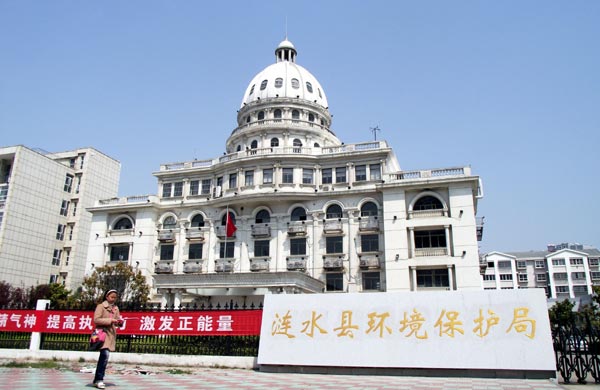Jubilantly 'werid' wonders
By Erik Nilsson and Zhang Lei ( China Daily ) Updated: 2014-11-08 09:00:30
 |
|
The office building of Lianshui's environmental protection bureau in Huaian, Jiangsu province, resembles the US' White House. Zhen Huai / China Daily |
The government headquarters of Yuhua district in Jiangsu's capital Nanjing is a replica of the US' Capitol Building, and neighboring Zhejiang province's Wenling's People's Courthouse is a facsimile of the US' White House.
"China's economy... has been distorted by rapid growth, which also distorts the design of buildings," Bene says.
"But sometimes this is good because these buildings become a symbol of a particular time and place in history."
Lip believes it's important to define "weird".
"'Weird doesn't always have negative connotations," he says.
"Almost all great artworks signal a departure from the norm and are seen as weird or unusual when created. Weird architecture only becomes bad when there's no meaning behind its difference or when the pursuit of difference serves very little. So, let's say 'weird' refers to unusualness, where buildings' unusualness isn't easily understood. I don't like buildings that adopt stylistic forms but have very little relevance and meaning for being the way they are."
He points to unconventional structures in boomtowns like Erdos-a megacity on China's border with Mongolia with everything a megalopolis could want, minus the population.
"(They) are designed to be visually striking and isolated objects but serve very little purpose or meaning to the people of Erdos for whom they're supposed to be built."
Lip points to Bilbao's Guggenheim Museum and Paris' Eiffel Tower as cases of unorthodox architecture that work.
"'Weird' can start to be inspiring when people can understand and appreciate its uniqueness-when a certain beauty or purpose is fulfilled," he says.
China hosts at least three Eiffel Tower copies, as well as duplicates of Thames Town and other Western cities.
"It's equally disastrous from a cultural point of view that so many Chinese cities are built in short spans of time, resulting in so many mundane and normal buildings within generic cities that all look the same," Lip says.
"How can the next generation of Chinese people find their own identity or be inspired to do wonderful things with their lives if they all live in cities that are soulless and look more or less the same?"
|
|
|
|
|
|
|
|

























 Raymond Zhou:
Raymond Zhou: Pauline D Loh:
Pauline D Loh: Hot Pot
Hot Pot Eco China
Eco China China Dream
China Dream China Face
China Face






